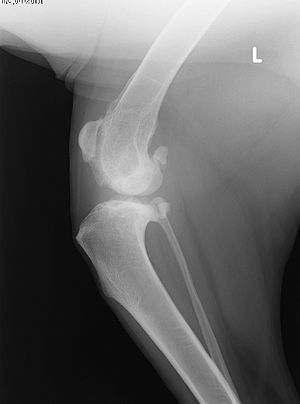
Pets rarely suffer from kidney stones, but can have the more common bladder stones.
These stones often pass into the urethra. They can be different sizes and there can be one or more. If the stones are small enough, they can be passed. Larger ones can cause an obstruction in the lower urinary tract.
There are several different types of bladder stones. Uric acid stones are formed in an acidic urine. Dalmatians, Bulldogs and Russian Black Terriers are more prone to this type having a genetic metabolic abnormality. Sturvites are a more common stone formed in an alkaline urine. Sturvites may occur after a bladder infection.
Calcium oxalate, cystine and silica are names of other less common stones. Silica stones are rare and are found most often in male German Shepherd dogs without previous bladder infections. Neutered male Burmese, Persian and Himalayan cats are genetically predisposed to calcium oxalate stones.
Symptoms can be straining to urinate but producing little urine, bloody urine, frequent attempts at urination. The pet may vomit, refuse food and become lethargic and appear to be in pain.
A blockage caused by the stone(s) is very painful and can result in a buildup of toxins in the blood stream leading to kidney damage and rupture of the bladder. If your pet shows any signs of being ill, s/he needs to be examined by the veterinarian as soon as possible.
Diagnosis is made by the vet palpating the abdomen followed by x-rays and/or ultrasound. Sometimes a dye is introduced for contrast when the stones are not easily detected by x-ray.
Depending on the seriousness of the condition, stones may be dissolved through special diets which must be fed exclusively. It is a very slow process and the pet continues to show symptoms. The amount of water consumed should be watched as it’s important for the pet to drink. Dogs normally drink enough, but cats need to have their water consumption increased. Stones may also be broken down using shockwaves (Lithotripsy).
Surgery to remove the stones is the most effective treatment. After removal the stones are then examined to determine which type they are.
After a short period of recovery from surgery, a special diet may be recommended to prevent stones from recurring. The pet should also have regular checkups at the vet so that if stones do recur, treatment can begin before they are fully formed.
To reduce the chances of calcium oxylate crystals forming, feed your pet natural raw or home-cooked meals. Aovid wheat, spinach and strawberries as they have a high oxylate content. Add probiotics daily to the diet.
Related Articles


